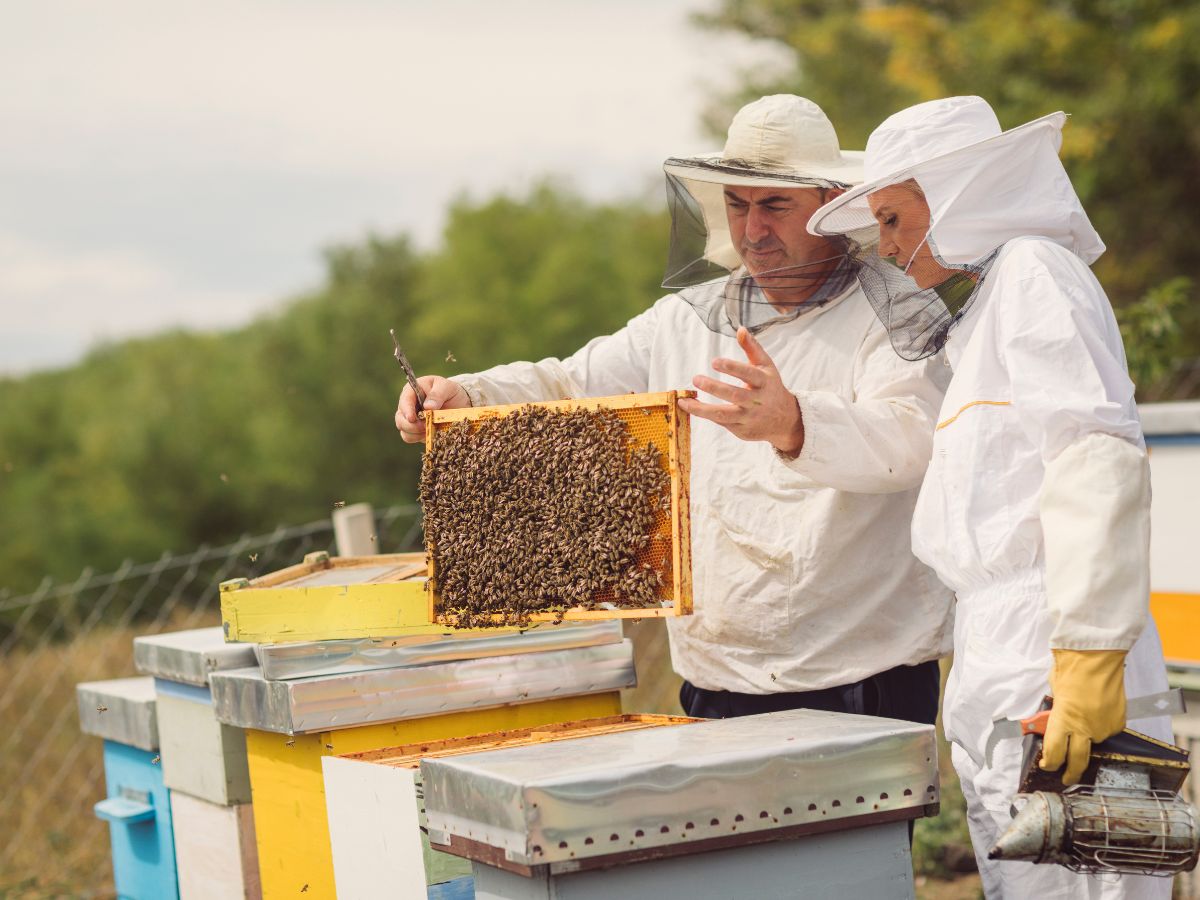In the beginning, every beekeeper gets stung very often. But with experience, they earn the ability to reduce the chances of getting stung by bees to almost zero.
So, How Do Beekeepers Not Get Stung?
With the experience of handling their colony, beekeepers gain the ability to interact with bees without getting stung. They select the right timing and follow all the rules for hive inspections. That’s why beekeepers do not get stung quite often.
But this is not like they never get stung. All beekeepers get stung sometimes, it’s a common phenomenon for them.
In my previous post on Do beekeepers get stung? I have shared my personal experience of getting stung by bees at the beginning of my beekeeping journey.
But as I started more times with my colony and learned their behavior. I earned the capability of inspecting my hives without getting a single stung.
That’s what I am going to share with you throughout the whole post. If you can follow these rules properly, you will be able to inspect hives without getting stung. Let’s try to figure out first, why do bees sting.
Why Do Bees Sting?
Bees don’t sting any creature unless it becomes a threat to them. Honey bees can sting only once in their entire life. So, she will sacrifice her sting only if there is any danger for her or for their colony.
There are some other bee species too like bumble bees who can sting multiple times. But these species will try their best not to sting you unless you interrupt them.
Do Honey Bees Sting Hurt?
Yes, honey bees sting in most cases does hurt. Usually, the pain can be mild to severe depending on the type of honey bee, and the location of your body where you get stung.
Honey bees inject venom from their sting into the attacked area of your body. The attacked area may start to sweal within a few moments. If you have allergic syndrome to bee stings, it can be worse for you.
My cousin got a serious skin problem after getting attacked by a bee swarm. So, you can understand how serious it can be sometimes getting stung by bees.
So, you can understand bee stings can be a serious matter of worry for someone who has allergic syndrome to bee stings.
How Do Beekeepers Not Get Stung?
Beekeepers do not get stung because of their right hive inspection techniques. You can also avoid bee stings as a beekeeper by understanding your bee’s behaviors. Also, taking proper protection before approaching hive inspection helps beekeepers to avoid bee stings.
Now let’s discuss some important factors that effectively help beekeepers avoid bee stings. These might be helpful for you too.
I have 11 tips for you to avoid bee stings. If you follow them you will be able to reduce your chances of getting stung by bees to almost zero.
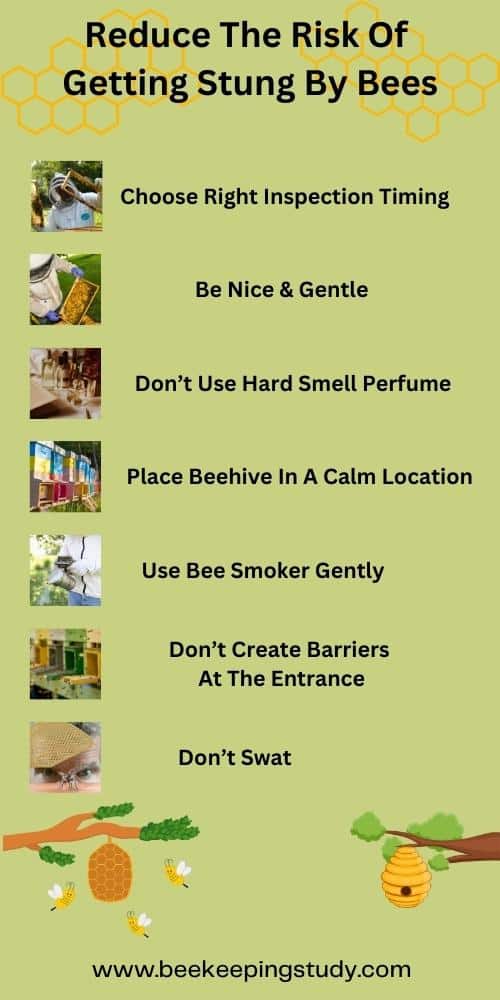
1. Select The Perfect Time For Hive Inspection
Remember if bees are not in a good mood and the weather is not in their favor they will be more likely to sting anybody.
As I told you bees won’t sting unless they find any danger coming. If you try to inspect the hive when there is a scarcity of food, or the weather is too cold, you have a higher chance of getting stung.
Because under these circumstances, bees become very angry. So they are very likely to sting anybody. This is why selecting the right timing for hive inspection is really important.
Also, you should learn when you should avoid opening the hive for inspections.
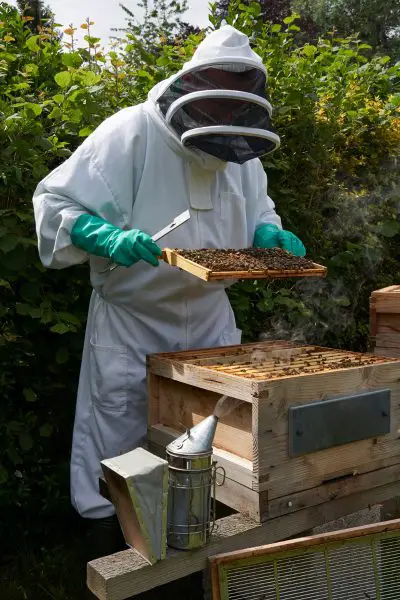
What Is The Right Time Of The Day For Hive Inspection?
Remember if the day is cloudy, rainy, or stormy don’t try to open the hive. When it is a warm nice chill sunny day then you can inspect your hive. The right time of the day is 12 am to 2 pm when the temperature is within 20-30°C.
2. Be Aware Of The Season
You can inspect hives more often in summer than in fall and winter. Because during summer bees have a sufficient amount of food and the weather is also bee-friendly. But In the fall bees become very angry as food is scarce.
In winter bees also require to work hard to control hive moisture. So, you can understand bees aren’t in a good mood within fall and winter.
That’s why you should try to inspect the hive within these seasons as less as possible. You don’t even need to inspect the hive unless you find any symptoms of food shortage or dead bees around the hive.
In the winter if you find bees are having difficulty controlling extra moisture inside the hive, you can help them by placing a beehive moisture board or quilt box.
3. Check Is There Queen Exists Or Not
In most cases, bees become very angry if they lose their queen. Especially If bees lose their queen during or early winter it will become very very bad for them. Because it is almost impossible for a queenless hive to survive the winter if you don’t help them.
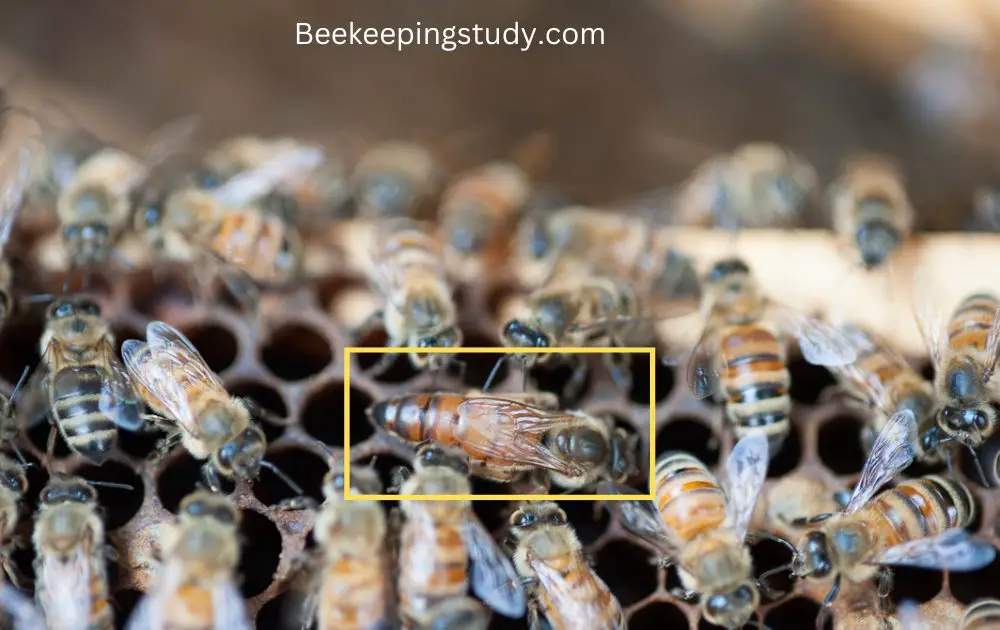
So, look for the queen first when you see your bees behaving rudely. If you find the hive is queenless, try to requeen the queenless hive as soon as possible.
4. Wear Bee Suits
You can wear bee suits which you can make by yourself or purchase from an online store to avoid bee stings. You will find a lot of different types of bee suits all over the internet. Select the right one that suits you. This will help you to prevent bee stings.
5. Wear Gloves, Shoes And Cover Your Head
Besides wearing bee suits you should also wear gloves and cover your head. You can use a round-brimmed hat with a mesh veil to cover your head and neck.
It is better to use a pair of shoes having a deep layer that can prevent bee stings from injecting into the leg.
In simple words, you can cover your entire body to prevent any damage by the sting.
6. Use A Bee Smoker
The bee smoker is used to calm bees. When they are calm, they won’t fly and be able to sting anybody. So, you can use a bee smoker to prevent bee stings.
Remember don’t use any fuel that contains harmful chemicals for bees in a bee smoker. You can select any fuel that is made with natural elements and doesn’t produce any harmful smoke for bees.
You can use cotton or smoking pellets. I would suggest you use smoker pellets in a bee smoker. But before using this you should learn the proper way of using a bee smoker with pellets.
7. Clean Your Beekeeping Suit, Gloves, And Shoes
Each time after coming home from the hive inspection you should clean all the stuff you wore during the hive inspection. You will find propolis, wax, sting, and sticky materials stuck on your clothes. That’s why you should clean them regularly.
At first, tell someone to remove the bee stings from your clothes before pulling them off. Then Wash your bee suits and beekeeping gloves properly to use them safely for a long time.
8. Place Your Hives In A Suitable Location
The beehive should be placed in an open space. If possible far from the place where people walk very often. That’s why most expert beekeepers select the backyard of their house for placing beehives.
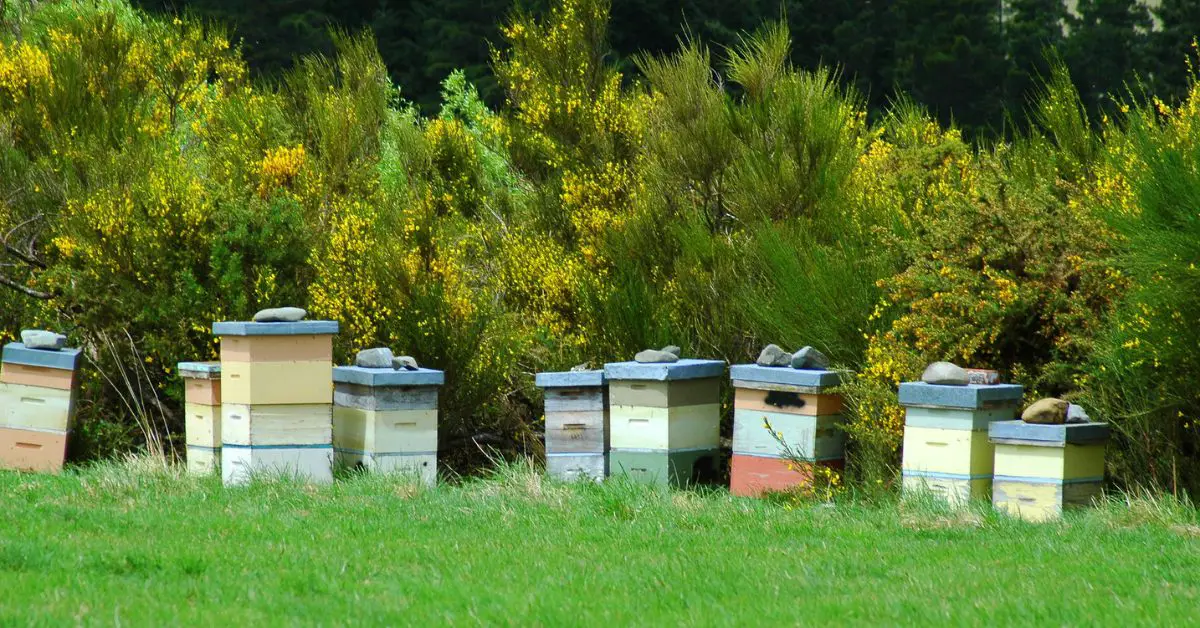
So, you should select the perfect location for beehives where a large free space is available and it should be away from crowded places.
You can cultivate some flower plants near your beehives. This will also help them to collect pollen and nectar from the nearest location.
9. Don’t Create Any Barrier At The Entrance Or Inside The Hive For a Long Time.
If you put a wall at the entrance of the hive or inside the hive this will make them angry. Also, if they get disturbed for a long time they will swarm away. So, creating disturbance to their colony for a long time not only force bees to sting very often there is also a chance of losing your bees forever.
10. Don’t Use Any Hard Smell
Bees are sensitive to smell. They don’t like any hard smell. If they find any hard smell they will think it is a sign of danger. So, they will become protective and more likely to sting you.
So, during hive inspection don’t use any perfume, body spray, and other smelly substances. Also, don’t take any alcohol and avoid smoking before and during a hive inspection.
11. Be Gentle And Never Swat
Last but not least you should be very gentle with them during a hive inspection. If you accidentally got stung by a bee take primary treatment but don’t swat or squeeze her.
If you swat her other bees will become more aggressive and will start stinging you. Because bees work together and can sacrifice their life for the safety of the colony.
So, you must work gently and never swat bees in order to reduce the chance of getting stung by bees.
Besides these 11 tips, another very important thing is choosing the right type of honey bee for beekeeping. Different bees show different intensities of aggressiveness. So, you should choose the right type of honey bees that most suites in your region, and your goal of beekeeping.
What Happens When A Bee Stings?
After getting stung by a bee the affected area started to pain and swell. The pain can be from mild to sometimes large. If someone has an allergy to bee stings then he or she might get into serious trouble from bee stings.
Don’t think that a bee sting can only cause harm to you. Honey bee dies after stinging. So, they try their best to avoid stinging you unless you become a threat to them.
How To Treat A Bee Sting?
Don’t worry in most cases bee stings cause less damage to humans. You can take primary treatment for bee sting as follow:
- Don’t be hurried or over-panicked. Look for a bee sting in the affected area and if you find it, remove it using a blade or thin plastic card or by using the chest of a knife.
- Wash the affected area with soap and water. If you can apply baking soda with a water mixture it will be best.
- You can also apply ice to reduce the pain and swelling.
But if you felt threatened after getting a bee sting don’t waste any time without seeking medical treatment. Also, if you have an allergic infection you must look for a good doctor.
Is It Possible To Build Immunity To Bee Stings?
Yes, it is possible to build immunity to bee stings. If you don’t have an allergic reaction to bee stings then you don’t have to take any medical treatment for this. You will gain immunity to bee stings automatically after getting stung for a few days during hive inspections. But if you have an allergic reaction to bee stings then you can take venom immunotherapy to build immunity to bee stings.
Venom Immunotherapy known as VIT is applied to those beekeepers who have an allergic reaction to bee stings. For this, you have to take injections for a few weeks or months. Then your immune will become able to defeat the venom injected by bee stings into your body instantly.
If you don’t have any allergic syndrome to bee stings then you don’t have to be worried about bee stings as you will automatically gain immunity to bee stings.
That’s why you will see some experienced beekeepers working with bees without any gloves and protection. They are still getting stung but it doesn’t hurt them. Because they already gain immunity against bee stings. Now bee stings feel like mosquito stings to them.
Frequently Asked Questions
Do beekeepers get immune to bee stings?
It is found often that experienced beekeepers get immune to bee stings. Getting stung quite often makes their immune to cure the poison of bee stings fast. As a result, they do not feel much pain compared to other people.
How do you make bees not sting you?
I make bees not sting mine by choosing the right timing for the hive inspection. Also, I do want a thing that is moving things slowly during hive inspection. Bees do not like fast-moving things. So, if I move things slowly after opening the hive, they don't suspect me as a threat.
Will a bee sting you if it lands on you?
Bees do not sting by just landing on you. She may be taking a break during her flight and lay on you. Sometimes bees may find pollen stuck on your body or cloth. If you try to smash her then she will sting you.
Final Thoughts & Helpful Links
So, hopefully, now you know how do beekeepers not get stung often. If you can follow my instructions properly, your chance of getting stung during hive inspection will be minimal. But you might still get stung by bees sometimes.
Don’t be panicked. You will be used to bee stings. Once you will build immunity to bee stings the bee stings will be nothing for you.
But if you get an allergic reaction after getting stung by bees. Don’t hesitate and immediately seek medical help.
Be gentle to your bees and spend more time with them. Remember practice makes a man perfect.
The following links might be helpful for you.
- Check this article to know what should you do when you get attacked by a swarm of bees.
- P. K. Visscher, R. S. Vetter, and S. Camazine, “Removing bee stings,” Published: August 03, 1996. Read the research paper here.
- M. Eich-Wanger and M. Müller, “Bee sting allergy in beekeepers,” First published: 25 December 2001. Read the research paper here.
- T. Annila, E. S. Karjalainen, P. Mörsky, and P. A. Kuusisto, “Clinical symptoms and immunologic reactivity to bee and wasp stings in beekeepers,” First published: July 1995. Read the research paper.

